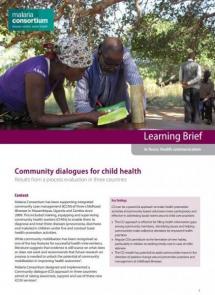Success Story: Media Development and Capacity Building in Action
The Ghana Communicate for Health Project ran from 2015-2019. As part of its efforts to address regional perspectives and needs, Communicate for Health conducted two collaborative workshops to discuss region-specific audience research and design creative materials that would address identified social and behavioral barriers and benefits in key health areas.
Both workshops engaged multiple private sector design partners, regional health promotion officers (RHPOs), technical focal persons for malaria and nutrition, representatives of local media houses, USAID implementing partners (IPs), and other regional stakeholders to produce GoodLife materials for their areas of the country.
Both workshops featured intensive SBCC capacity building experiences for participants while strengthening networks for sustainable regional collaboration.
In an evaluation of the workshop process and outcomes, participants gave the overall experience a score of 8.3 out of a possible 10 points, indicating a high level of learning and satisfaction. Some said the workshop was the first time they had the opportunity to work on each step of material development—from a creative brief to actual production. Many appreciated the opportunity to review audience research for their particular areas.
Source: Communicate for Health Ghana
Date of Publication: January 28, 2020
SIMILIAR RESOURCES
Tools
Examples
- Entertainment-Education Curriculum
- Social and Behavior Change Research Spotlights
- Improving Interpersonal Communication Between Health Care Providers and Clients
- mHealth Mobile Messaging Toolkit: Considerations When Selecting a Mobile Messaging Platform Vendor
- Using SWOT for a Neighborhood Development Project
- Service Communication Implementation Kit
- Provider Behavior Change Implementation Kit
- SBCC Check-In Quality Improvement Tool
- Developing a Social and Behavior Change Research Agenda
- Ecological Models



